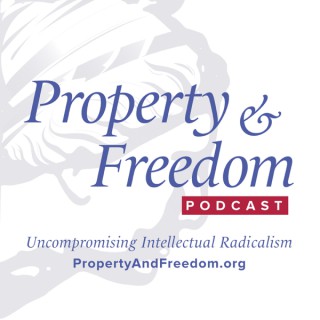Podcasts about Hoppe
- 751PODCASTS
- 2,168EPISODES
- 1h 1mAVG DURATION
- 1DAILY NEW EPISODE
- Feb 28, 2026LATEST
POPULARITY
Categories
Best podcasts about Hoppe
Latest news about Hoppe
- Mariners Prospect Rankings #16, RHP Alex Hoppe MLB Baseball News, Scores, Standings, Rumors, Fantasy Games - Feb 24, 2026
- Challenging The Efficient Market Hypothesis And Fundamentals Analysis Eurasia Review - Feb 17, 2026
- Corpus Scriptorum Ecclesiasticorum Latinorum: Critical Editions of the Works of the Latin Church Fathers AWOL - The Ancient World Online - Feb 16, 2026
- Angels catcher Logan O’Hoppe brings fresh approach to 2026 Orange County Register - Feb 12, 2026
- How late Austin Peay president Sherry Hoppe led return of scholarship football Yahoo! Sports - Jan 28, 2026
- Ersatz Unterkonstruktion Hoppe Buntbart Rosette Thingiverse - Newest Things - Dec 20, 2025
- A Family Heirloom: Dad’s Heckler and Koch Model 940 SOFREP - Dec 17, 2025
- Liechtenstein’s Feudal Prince Has Become a Libertarian Hero Jacobin - Dec 2, 2025
- Mariners Acquire Alex Hoppe, Designate Tayler Saucedo For Assignment MLB Trade Rumors - Nov 18, 2025
- Memorial service planned November 15 for Brian Hoppe, 1958-2025 West Seattle Blog… - Nov 7, 2025
Latest podcast episodes about Hoppe
Saturday Is For Hoppe Hour! (Hoppe Hour With Ryan Hoppe: 2.28.26)
Saudi music producer Saud Alturki: 'High Octane,' Busta Rhymes and the pressure that made him
The TWENTY30's co-hosts Hanaa Almoaibed and Lucien Zeigler sit down with Saud Alturki, Saudi music producer, curator, and founder of Brij Entertainment ahead of the release of his third album, High Octane. A project two and a half years in the making, the track list reads like a love letter to hip hop royalty. Busta Rhymes. Swizz Beatz. West Side Boogie. Rhapsody, whom Saud calls his favorite female MC alive today. Working with his creative director Chindi, who turned every production conversation into something closer to a therapy session, Saud landed on a concept that's deeply rooted in where he's from, the Eastern Province of Saudi Arabia. Saud takes us back to the beginning: a freshman at McGill in Montreal, freezing through his first Canadian winter and discovering that music wasn't just something he loved — it was something he could do. A move to LA, a chance encounter at a Verizon store with a gospel-tinged R&B singer named Bernard, and seven years of patience later, he finally put out his first single. That story alone sets the tone for everything that follows: Saud is someone who builds slowly, deliberately, and for keeps. But the conversation doesn't stop at the album. Saud talks about what it really takes to build a music industry in Saudi Arabia — not just a music scene. Venues, labels, studios, government support, festivals like Middle Beast that have built an entire ecosystem around artists. He's careful to say Saudi isn't quite an industry yet, but the infrastructure is finally arriving, and the talent — including his Brij Entertainment artist Hajaj, the first Saudi to perform at Grammy weekend in LA — is already outpacing it. There's also a sharp, honest take on the streaming era, why dropping albums in 2025 is "not the best move" (and why he's doing it anyway), the emerging Saudi genre Hoppe — a fusion of Sambri and hip hop that he wishes he'd invented — and what he tells young artists in Riyadh who have every resource he never had at 17. High Octane drops after Ramadan.
It's A MadHouse I Tell You! (Hoppe Hour With Ryan Hoppe: 2.21.26)
Shut UP Brianna ChickenFry! (Hoppe Hour With Ryan Hoppe: 2.18.26)
Meditation With Ryan Hoppe! (Hoppe Hour With Ryan Hoppe: 2.12.26)
Hoppe Hour Loves Salsa Music (Hoppe Hour With Ryan Hoppe: 2.10.26)
A Taste Of Your Own Medicine! (Hoppe Hour With Ryan Hoppe: 2.9.26)
Shower With A Friend Day! (Hoppe Hour With Ryan Hoppe: 2.5.26)
Plenty Of Celebrity News! (Hoppe Hour With Ryan Hoppe: 2.3.26)
Hoppe Discusses Tampa Radio Billboards (Hoppe Hour With Ryan Hoppe: 2.2.26)
00:00-20:00: Buffalo Sabres insider Bill Hoppe breaks down the team still rolling after the 10-game win streak, what the future goaltending situation looks like, some of the prospects finally panning out, Tage and Rasmus dominating, how fast they looked in Toronto and more. Thanks to Batavia Downs Gaming and Stanley Law Offices. Hosted by Simplecast, an AdsWizz company. See https://pcm.adswizz.com for information about our collection and use of personal data for advertising.
Jemele Hill Responds To Ryan Hoppe (Hoppe Hour With Ryan Hoppe: 1.27.26)
Morty Calls Into Hoppe Hour! (Hoppe Hour With Ryan Hoppe: 1.26.26)
Is Ryan Hoppe Dangerous?! (Hoppe Hour With Ryan Hoppe: 1.19.26)
EP 349: 2025 NFBC Main Event Overall Winner Todd Hoppe
I am joined by Todd Hoppe, the 2025 NFBC Main Event overall winner. We discussed a wide range of things from preparing for drafts, diving in DC's early, tracking your teams, using projections, maneuvering through lineup decisions and FAAB while chasing down the title, the team he assembled in the draft and through FAAB and much morePullHitter merch is here! Welcome to the PullHitter Podcast, your destination for actionable resources and tools to grind your way to ultimate fantasy baseball success.Support my work and join the Pull Hitter Patreon:-Access to lively Discord with highly active members sharing player evaluations, draft boards and strategies..get a leg up on your league mates!-Player Breakdowns series in audio and video form-Draft recaps from me-additional Launch Angle episodes-additional Guest episodes-ad free listening-Much more!https://patreon.com/user?u=32383693&utm_medium=clipboard_copy&utm_source=copyLink&utm_campaign=creatorshare_creator&utm_content=join_linkFollow on twitter: @pullhitterpod https://twitter.com/PullHitterPod @deadpullhitterhttps://twitter.com/deadpullhitter Email : pullhitterpodcast@gmail.com Website: pullhitter.comMy link tree with all of my links in one spot:https://linktr.ee/pullhitterAlso check out me cohosting the Launch Angle Podcast with Rob Silver!https://anchor.fm/robe
I Hate You Jeffry Knight (Hoppe Hour With Ryan Hoppe: 1.13.26)
Ashley Tisdale Is A Brat! (Hoppe Hour With Ryan Hoppe: 1.7.26)
Florian Hoppe: Southeast Asia's Digital Resilience, AI Infrastructure & the Next Growth Wave - E659
Florian Hoppe, Partner at Bain, joins Jeremy Au to unpack insights from the Bain Southeast Asia Digital Economy Report 2025 and explain why the region's digital economy keeps growing despite global uncertainty and negative headlines. They explore the long-term forces behind this resilience, including consumer adoption, payments and logistics infrastructure, and sustained middle-class demand. The conversation covers the expansion from ASEAN six to ASEAN ten, how regional scale really works for founders, and why competition from China and global players continues to fuel innovation. Florian also explains why AI and data centers should be seen as foundational utilities, how local AI solutions create real value in healthcare and education, and what investors, policymakers, and parents should focus on as Southeast Asia enters its next digital decade. 03:03 Adoption drives resilience: Smartphone penetration, payments, logistics, and trust infrastructure enabled durable digital behavior over time. 05:52 ASEAN expanded from six to ten countries: New markets added population and long-term upside, even with limited short-term GMV impact. 08:51 Regional strategy depends on product depth: High-end offerings cluster in major cities, while mass-market products still scale across ASEAN. 14:18 AI growth starts with infrastructure: Data centers and talent form the base layer before real business value emerges. 15:52 AI in Southeast Asia prioritizes quality and access: Lower labor costs shift focus from cost cutting to better healthcare and education outcomes. 22:17 Digital economy reached policy relevance: It now represents a meaningful share of GDP and employs tens of millions across the region. 29:50 Preparing the next generation for an AI economy: Florian argues parents should train curiosity, abstract thinking, and learning ability, rather than over-optimizing for specific technical skills too early. Watch, listen or read the full insight at https://www.bravesea.com/blog/florian-hoppe-compounding-southeast-asia WhatsApp: https://whatsapp.com/channel/0029VakR55X6BIElUEvkN02e TikTok: https://www.tiktok.com/@jeremyau Instagram: https://www.instagram.com/jeremyauz Twitter: https://twitter.com/jeremyau LinkedIn: https://www.linkedin.com/company/bravesea Spotify English: https://open.spotify.com/show/4TnqkaWpTT181lMA8xNu0T Bahasa Indonesia: https://open.spotify.com/show/2Vs8t6qPo0eFb4o6zOmiVZ Chinese: https://open.spotify.com/show/20AGbzHhzFDWyRTbHTVDJR Vietnamese: https://open.spotify.com/show/0yqd3Jj0I19NhN0h8lWrK1 YouTube English: https://www.youtube.com/@JeremyAu?sub_confirmation=1 Apple Podcast English: https://podcasts.apple.com/sg/podcast/brave-southeast-asia-tech-singapore-indonesia-vietnam/id1506890464 #SoutheastAsiaTech #DigitalEconomy #AIinAsia #StartupEcosystem #VentureCapital #ASEAN #FutureOfWork #DataCenters #TechTrends #BRAVEpodcast
Going Through Hoppe's Inbox! (Hoppe Hour With Ryan Hoppe: 1.6.26)
MJ Morning Show, Fri., 12/19/25: Final Live Show Of 2025 - What Won't Dentists Do With Their Own Teeth?
On today's MJ Morning Show:The Mario Lopez cheese graterMorons in the news$700 to find the sound in the carRepo guy took a car with a kid insideFester's new show featureDenny's limited edition sneakerTampa Bay area woman kills two ex-husbands9 things dentists won't do to their teethColdplay kiss-cam woman speaks outOpen phones!Why was Hoppe's car towedGreg Biffle RIPClassic Crotchety - Drunk SantaMJ's FICO scoreEx-Missouri state trooper searched women's phones for nude photosMacaulay Culkin has no driver licenseJelly Roll pardonedRob Reiner said he was scared of NickWiz Khalifa was sentenced to jail in Romania for smoking joint while performingMJ wants to know who's ready for FCE at Tampa International AiportSee Privacy Policy at https://art19.com/privacy and California Privacy Notice at https://art19.com/privacy#do-not-sell-my-info.
The Intra-Austrian Debate over Milei and the Central Bank
This week, Bob walks through two related debates: Hoppe's criticism of Argentina's President Milei for not immediately closing Argentina's central bank, and the follow-up exchange between Guido Hülsmann and Philipp Bagus on Mises.org over dollarization and the peso. Along the way, he reviews Mises's distinctions among commodity, credit, and fiat money, the concepts of money substitutes and fiduciary media, and the interesting structure of Argentina's short-term central bank debtGuido Hülsmann and Philipp Bagus' Debate on Mises.org: Mises.org/HAP529aThe Human Action Podcast Episode with Nicolás Cachanosky: Mises.org/HAP529bBob's Study Guide to The Theory of Money and Credit: Mises.org/HAP529cThe Mises Institute is giving away 100,000 copies of Hayek for the 21st Century. Get your free copy at Mises.org/HAPodFree












































